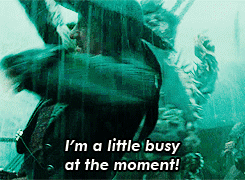I don't think I want to get on my own bad side next month.
Anyway, NaNo is always a bit interesting to me. Writing quickly is sort of seen as a bad thing in the writing community, but there's good reason. Too many people who participate in things like NaNo or write quickly in general don't put in the time to properly edit their work afterward. To be honest, I don't think many people reading this post will have that problem.
But I'll say it again in case this is the very first time you're seeing it: don't write a book in November and send it off in queries in December! Bad idea. Very bad.
Of course, as you well know if you've ever read my blog, there are exceptions to every rule. And in fact, once you're under contract with a publishing house, you may be expected to write quickly to meet deadlines. It may not be a book a month, but it may still be faster than you're used to.
Now for my confession:
I write better when I write quickly. And you might, too. So here are some tips on how to get the most out of an exercise like NaNoWriMo.
1.) Just. Write. It. Already. I see people stall out on books all the time. The common complaint is akin to Writer's Block ("I just don't know where to go next"). Well, personally (and everyone is different!), I always know the ending of my story before I begin. And I am a tried-and-true pantser. Sometimes I know the beginning, too, but for the most part it's like filling in a treasure map where the only mark I have to begin with is the "X", and I don't even know where I'm standing. Even if you don't know how the ending of your book is going to go down, chances are you've got some inkling of what you want to happen (So and So wind up together, apart, Bad Guy dies, Bad Guy lives, Good Guy dies, Good Guy lives, etc.). You don't NEED details. At least not to start.
Note: if you're a die-hard plotter, and you absolutely DO need details, your best bet for a quick writing exercise is to outline what you plan to write beforehand.
So once you have a general idea of your ending, you know that every scene in your book has to move the story that way somehow. Maybe you have an idea of how to get there from where you're at, but you can't connect the dots. That's okay.
Repeat after me: That's OKAY.
You don't need to connect the dots RIGHT NOW. If you're stuck, write the next scene you know is coming up. Just do it. Let go and do it. Even if you're missing crucial plot details, just plug in something silly like Bunnies and Carrots and write around it. You might be surprised. I can't say this is a miracle cure for everyone, but every time I've tried this, I've either a.) filled in the missing plot details/ scenes as soon as I moved on, or b.) realized I didn't even need the intermittent stuff I was so worried about in the first place.
2.) Carry a notebook with you everywhere you go. When I write quickly, I'm usually only able to do so because I live and breathe my story. I think about it every spare moment I have. Oftentimes, I get my best ideas when I'm nowhere near my computer. I carry a little lined notebook with me everywhere I go. I have a different one for each story, so I can fill it with ideas, place/ character names and traits, maps of my settings, plot lines, etc. I even sometimes write whole scenes or chapters by hand and transcribe them later on. By having a notebook handy, you won't forget that awesome plot idea you had on your way to work in the morning. Hopefully.
There are some pretty nifty cell phone memo apps for this kind of thing, too. I just prefer my notebooks.
3.) A draft is a DRAFT. Don't worry about making it pretty! Write. Get the story out of your head. The best thing about written words is that you can always change them later. You're not committed to something just because you typed it. Get the story out, fix it later. Remember, this isn't going to see the light of day for a while anyway. (RIGHT???) You'll have plenty of time to edit and tweak. It can be SO HARD to ignore typos and grammar and plot holes and lines of Bunnies and Carrots and Bunnies and Carrots but you'll be thankful you did later, when you have the bulk of the drafting out of the way.
4.) Re-read the previous scene when you sit down to write again. This is the best way I've found to re-connect with the voice, re-immerse myself, and pick up the story thread immediately after I left off. But try not to let yourself get caught up in editing while you're re-reading!
5.) If you do get completely stuck, talk your plot out to someone, even if they aren't really listening. This is quite possibly the single most important thing I can leave you with. Sometimes, sharing your plot out loud with someone else will kick-start your own plotting brain and give you the answer you're missing. It's human nature. When discussing a problem with someone, our brains start looking for a solution. So even if the other person has no context for the issue or isn't suggesting things that will work, I often find that the answers come to me when I talk it out.
So remember kids, just get it out of your head. Worry about fixing it later. And most importantly, FIX IT LATER before ANYONE ELSE SEES IT. Okay. I think my work here is done.
Happy speedy writing!
